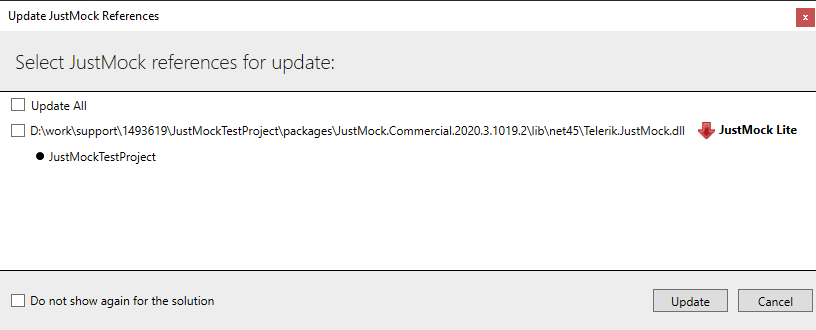Hi.
i saw this: https://www.telerik.com/forums/how-can-i-mock-multiple-instances-of-a-struct
but still dont understand why JustMock works that way in the first place. why does it union struct mocks by value?
the above solution is only possible when i mock a struct i can change (and then add the id to it) but what about struct's from the framework that i cannot control? Is there a way to tell JustMock not to union mock structs?
Thanks,
Yosi
The issue is about interoperability between JustMock and AutoFixture. The unit test run can be 90% faster if all the fixtures are created before the JustMock arrangements.
Here is a sample code that figures out the issue:
[Fact]
public void Slow
{
var fixture = new Fixture():
var items1 = fixture.Create<List<Item>>();
Nock.Arrange(() => ItemsRepository.GetItems1()).Returns(items1);
var items2 = fixture.Create<List<Item>>();
Nock.Arrange(() => ItemsRepository.GetItems2()).Returns(items2);
var items3 = fixture.Create<List<Item>>();
Nock.Arrange(() => ItemsRepository.GetItems3()).Returns(items3);
var items4 = fixture.Create<List<Item>>();
Nock.Arrange(() => ItemsRepository.GetItems4()).Returns(items4);
}[Fact]
public void Fast()
{
var fixture = new Fixture():
var items1 = fixture.Create<List<Item>>();
var items2 = fixture.Create<List<Item>>();
var items3 = fixture.Create<List<Item>>();
var items4 = fixture.Create<List<Item>>();
Nock.Arrange(() => ItemsRepository.GetItems1()).Returns(items1);
Nock.Arrange(() => ItemsRepository.GetItems2()).Returns(items2);
Nock.Arrange(() => ItemsRepository.GetItems3()).Returns(items3);
Nock.Arrange(() => ItemsRepository.GetItems4()).Returns(items4);
}The test duration should not be dependent on the exact implementation.
Dear Telerik team,
It is nice to have a way to generate mocks.
But it is annoying to have lots of those messages for references in XML comments. I had to turn the feature off. Which might be the case for other customers too.
Maybe you want to have a look into it.
JustMock interprets anonymous types as tuples. The sample below demonstrates the issue:
public interface IAnsweringService
{
(int code, string desc) GetAnswer(string question);
}
[TestMethod]
public void AnswerToTheUniverseQuestionTest()
{
var apiMock = Mock.Create<IAnsweringService>();
var expectedAnswer = new { code = 42, desc = "Answer to the Ultimate Question of Life" };
Mock.Arrange(() => apiMock.GetAnswer(Arg.AnyString)).Returns(expectedAnswer);
var actualAnswer = apiMock.GetAnswer("What is a universe question answer?");
Assert.AreEqual(expectedAnswer.code, actualAnswer.code);
Assert.AreEqual(expectedAnswer.desc, actualAnswer.desc);
}Telerik.JustMock.Core.MockException: The chained return value type '<>f__AnonymousType1`2[System.Int32,System.String]' is not compatible with the arranged method's return type 'System.ValueTuple`2[System.Int32,System.String]'
The following code snippet causes a hang in the test execution while being debugged:
Mock.SetupStatic(typeof(TimeSpan), Behavior.CallOriginal, StaticConstructor.NonMocked);
Mock.Arrange(() => TimeSpan.FromSeconds(15)).Returns(TimeSpan.MinValue);The issue can be temporary solved by disabling the DebugWindow via JustMock extension menu.
Considering the following simple test scenario:
public abstract class TestBase
{
public static TestContext TestContext { get; set; }
}
[TestClass]
public class UnitTest1 : TestBase
{
[ClassInitialize]
public static void ClassInitlialize(TestContext ctx)
{
TestContext = ctx;
}
[TestMethod]
public void TestMethod1()
{
}
}
[TestClass]
public class UnitTest2 : TestBase
{
[ClassInitialize]
public static void ClassInitlialize(TestContext ctx)
{
TestContext = ctx;
}
[TestMethod]
public void TestMethod1()
{
}
}Attempt to run the tests above with JustMock profiler enabled fails with System.InvalidProgramException. The issue is not reproducible with MSTest.TestFramework and MSTest.TestAdapter packages prior to 3.0.x.
Implement support for mocking of an operator such as the one described.
The threading model of UI apps differs from the test host and this might become a source of issues like the following: System.InvalidOperationException: "The calling thread must be STA, because many UI components require this". The request is about extending JustMock with some helpers that can be used to solve this issue easily.
The new public API should allow the developer to access the invocations for a particular arrangement. Something like the following:
IEnumerable<IInvocaiton> invocations = foo.GetInvocationsFor((x) => x.CalcData(2, 2));
The documentation on Fluent Mocking ends with this statement:
Important
Note that when you use Fluent Asserts only arrangements marked with either MustBeCalled or Occurs will be verified. For other tests you have to use the explicit assert.
What this fails to note is that, while this is true of the function "Assert", there is another function, "AssertAll", which will flag an error if any Arranged function call was not utilized.
On a related note, I left other suggestions for this same page a day or two ago. I would have liked to leave the above statement using the same feedback utility, but I can no longer find the control that I used to leave those initial suggestions.
Update reference functionality wrongly suggests updating JustMock assembly reference and even more - detects currently referenced one as a lite version, see the screenshot below:


